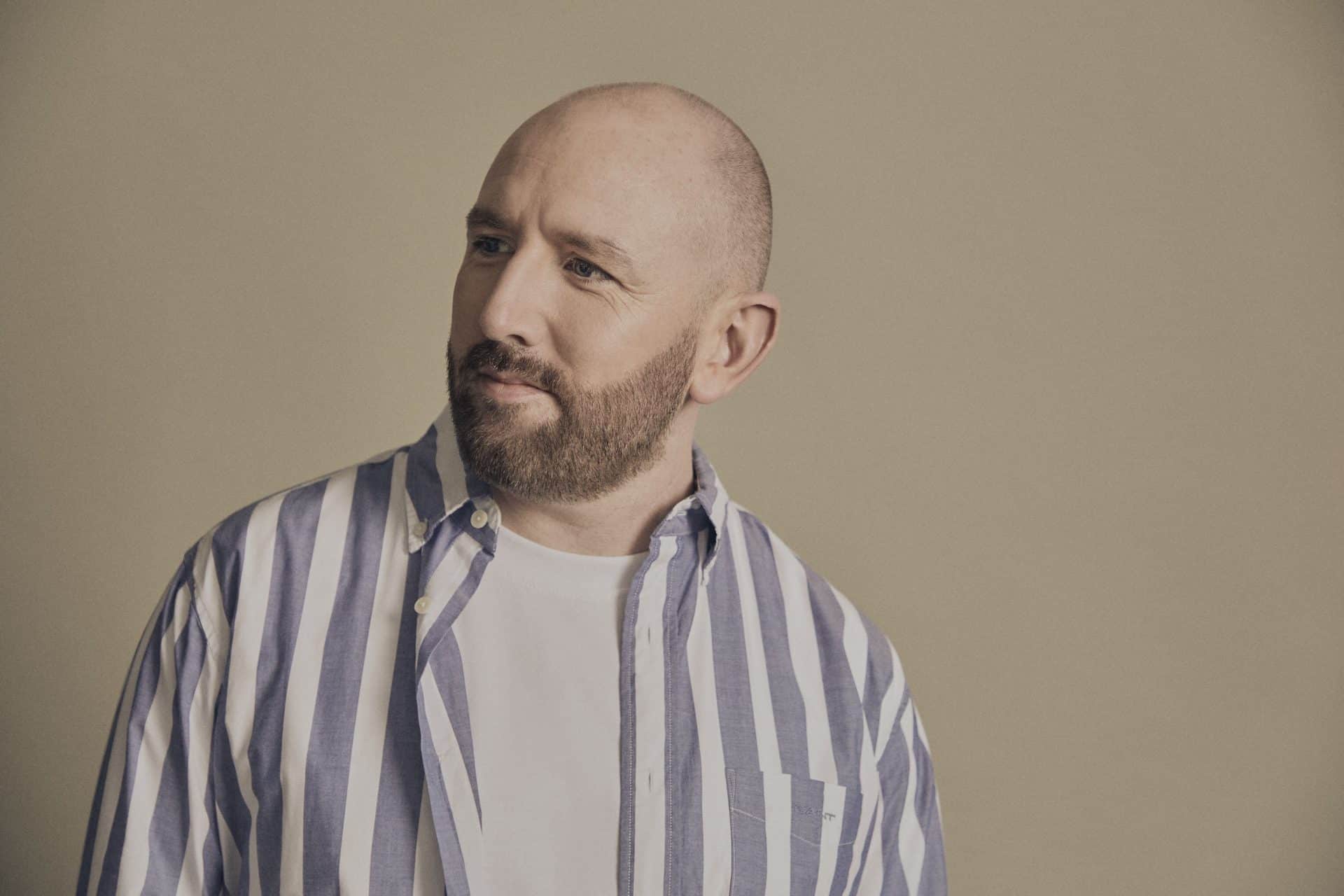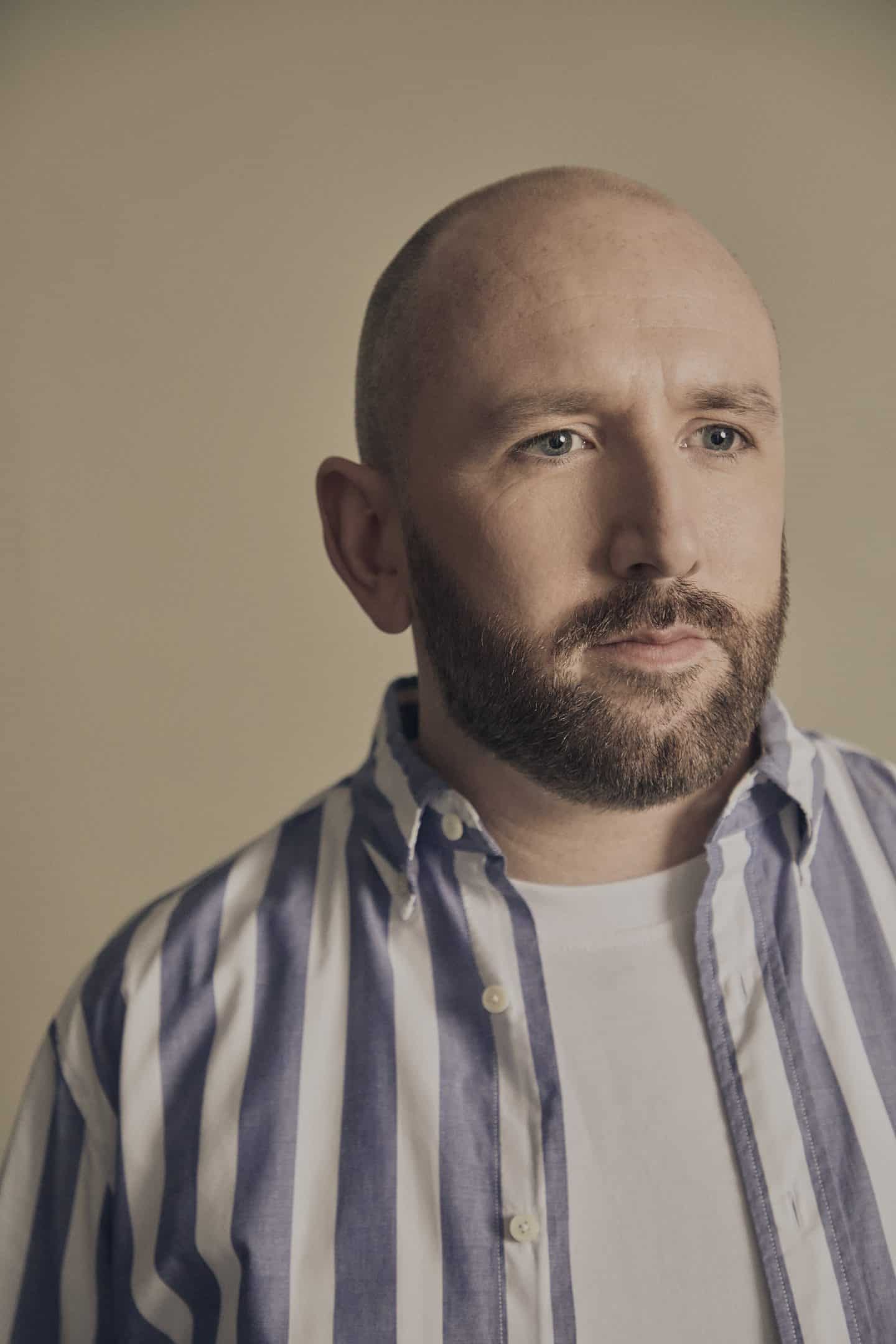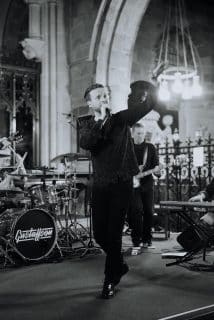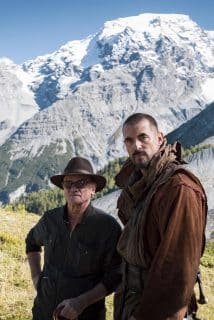David Carlyle: “Dinosaur is Barbie to Baby Reindeer’s Oppenheimer”
Culture
David Carlyle is back on our screens in BBC's new comedy Dinosaur, back on stage in London, and still processing the effect of It's a Sin...
David Carlyle is doing great things in BBC 3’s lovely new comedy, Dinosaur. A deceptively gentle Scottish comedy about Nina (Ashley Storrie, also the co-creator/writer), who is autistic and navigating changes when her sister becomes engaged. David plays Bo, her older brother, in what is a gem of a series he describes as, “Barbie to Baby Reindeer’s Oppenheimer.” Of course we all know him best from It’s A Sin, where he was heartbreaking as Gregory Finch and Bafta-nominated for his performance. The show was an immediate hit and the kind of cultural moment that doesn’t just touch audiences, but changes lives and provides a gateway for people to tell their own stories. Its legacy seems to grow stronger over time and David says he still receives a big reaction from the public who want to share things with him. Currently appearing in Boys on the Verge of Tears at the Soho Theatre, we managed to get some time with David before his evening show and talked about comedy acting, why he’s glad he didn’t become a doctor, Mrs Doubtfire, Father of the Bride and self-care. Brilliant man, brilliant show…
What are you working on at the moment?
It’s a play called Boys on the Verge of Tears at the solo theatre. It’s good, but it’s tiring. It’s a big ask for the actors, because we jump between characters. lI’ve got 11 characters and there’s 50 characters in total, so it’s a busy one. It takes me all day to recover in order to do the show again at night.
How do you look after yourself for such a thing?
It’s about preparing yourself, for like a long journey. It’s definitely a stamina thing, but I’m getting used to it again. It’s been years since I’ve done theatre, like four or five years. It used to be that was my bread and butter and I was definitely in a routine of it. Filming is the exact opposite. So I’m definitely getting used to it, but it’s about taking care of the body and having baths and eating well and all that.
Are you enjoying it, though?
Definitely. It’s a challenge, a good challenge. I like the director and the writer a lot. I think I’m enjoying it more now because we’re getting used to it. You find economy in the performance, it’s not costing you as much as it used to, so you can enjoy that moment. There’s so much happening backstage, we’re changing costumes constantly. And I’ve been trying to find the economy in that. At first it felt like such a task every night, whereas now I’m enjoying it.
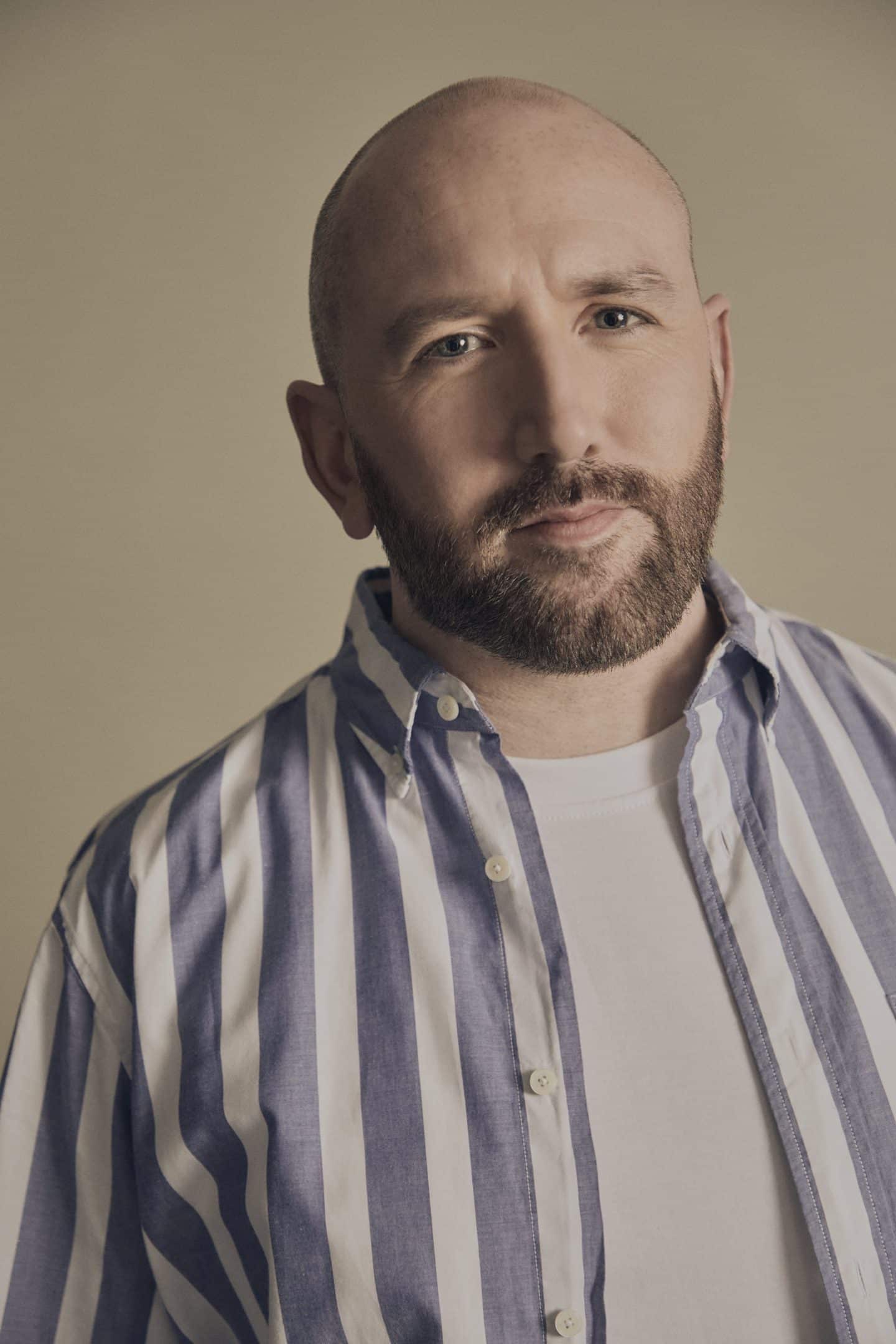
Can you tell us about Dinosaur, and how you got involved?
I mean, it was as simple as an email came in saying, ‘Do you wanna have a look at the script?’
I went and met Ashley Storrie, who’s the co-creator and she’s playing the lead, Nina. I met her and worked out family dynamics, you know, whether we were going to gel and that was it. Because Two Brothers Pictures were making it, the company who made Fleabag, I thought I’m in good hands.
It was quite quick, too. I mean, I got the job, and then within a month I was filming. I’m really proud of it, it’s really good fun.
Can you tell us about your character?
OK, so Bo is Nina’s older brother and he’s a bit of a black sheep of the family, an outsider. If Nina and Evie are soul mates as sisters, he’s definitely the exact opposite. He doesn’t want anything to do with the family. It’s all too much for him. It’s all too chaotic.
I think he just wants a normal life, but Nina is throws him for a loop, really, with how she responds to Evie’s engagement. And he has to step up and be a good older brother.
That’s a fun little journey to track, because we’re looking at human beings. It’s not a huge, Game of Thrones narrative here, it’s just a family trying to work out problems, so it was just nice to find those nuances with him and figure out what he is and how he behaves around his family and what makes him tick.
How difficult is it doing comedy in terms of of making sure you’ve got it right. I can imagine reading it on page is one thing but delivering it on camera is something else. How does it work when you’re there in the room?
Yeah, that’s a good question. Like I didn’t really think about it really. I thought, acting is acting. But comedy is a lot more technical, I think, because the punch line is not necessarily in your scene. The episode has been somewhere else, setting up that punchline. so you’ve got to be conscious of the overall narrative and the overall arc – of what’s happening in that episode, and then what’s happening in the series and making sure that you’re fitting that purpose.
There’s a lot more of a technical process to create a new character, because if you went some way with it and it doesn’t fit the world, then it doesn’t fit the joke. You have to look at what’s the purpose of your character versus the protagonist. It was a lot more of a crafting process than doing drama.
My experience of drama is that of course you have to think of the overall narrative, but ultimately you’re in charge of your character and your character’s story. Whereas in this case, you are like, what do I serve for the other people? Thinking about it from that point of view is a really fun way to work, I think.
Then also it is like, on the floor you’re doing funny things and nobody’s laughing – because you can’t laugh because otherwise there’s too much noise. So it’s really weird.
In a lot of the scenes, it seems it’s all about your reactions to her. So much is resting on the pauses that you have to make, and all those bits feel crucial in whether or not it’s funny.
Totally. There’s a scene in episode five, I think, where we’re all having breakfast, and it’s about me clocking that.something’s odd. It’s quite a long scene, too, and camera just turned on me to catch my eyes as I think about everything, and I thought, ‘That’s the entire scene for me.’ I’ve got, like, one line at the beginning, and then at the end I go, ‘What’s going on?’ The rest of is just me thinking about everything for a long time. I mean, that scene probably last about five minutes, and it’s a lot of reaction shots. You can run out of them after a while, but what’s good about having Ashley there as the lead is that she has the authority as one of the co creators to go, ‘let’s try this, let’s try that’ so you always get a couple of fresh takes which feel a bit more improvised.
Did you film it in Glasgow?
Yeah, that’s my hometown. I live in London and my mum and stepfather moved out of town now, and I’m rarely in Glasgow so it was it was a nice experience.
I’ve done a lot of work in Glasgow over the years, filming, but it’s always been in a building, or in a studio. Being out in the streets of Glasgow doing Dinosaur was kind of mad, going to places I’d never hung out in, like some of the parks. I was like, ‘Why have I never been to this place, it’s amazing.
But then equally like there’s the bar scene, in episode two, that’s just up the road from Sauchiehall Street, where I had so many nights out and fun, memorable experiences between 18 and 25.
I definitely felt quite emotional walking around at one point. I went for a coffee and I was wandering around thinking it was a bit of a full circle moment. Like wanting to be the actor who’s filming on the streets of Glasgow, and then now doing it. It was great.
Did you always want to be an actor? Was it always something that was on your mind?
Yeah, it definitely felt like the natural way. My mum didn’t know what to do with me because I was always performing in one way or another. She sent me into youth groups. and it was that very normal journey of just liking it, doing it and then wanting to do it when I went to University.
But there was a moment…in the Scottish system, you have to really choose in fifth year when you’re only 16. You’ve got five subjects. and those five subjects have to add up to a degree. Drama was this bolt on to the five subjects. The rest of them were sciences and English and maths because I wanted to be a doctor.
I was going to be a doctor and I got all the grades for that. But at the end of school and I said I think I’m going to go to drama school. My parents were very happy with that. But looking back, you know, it was such a crossroads. I could have done something so different.
My husband’s a paramedic, and now I know that I should never have done a job with anything medical. The stories he tells me I’m like, ‘Dealing with that? No, thanks.’
Who were your acting heroes when you were younger or even now?
Well now it’s a better, but I was really uncool when I look back. I wish I was saying Marlon Brando or whatever, but it wasn’t, it was Steve Martin and Martin Short.
I just think they’re iconic and they’re having a resurgence with Only Murders in the Building. Martin Short in Father of the Bride, I mean, it’s just ridiculous, And maybe that’s why I should always have done comedy because they are my heroes.
Robin Williams. Mrs Doubtfire is my favourite film by far. And when he would do dramatic roles as well, like One Hour Photo, he’s just amazing.
And I guess now it’s Meryl Streep. I wasn’t conscious of Meryl Streep when I was growing up, but everything that she does is just amazing. Viola Davis too.
But Father of the Bride and Mrs Doubtfire are my go-to’s if I have time to kill. And if you think about Joe Pesci in Home Alone – he’s obviously amazing in Goodfellas, but those kids films where they’re just brilliant, I’d love to do one of them, these amazing performances can come out of it.
With regards to It’s A Sin, how is it now looking back on it? It’s become so much of a landmark show.
I feel like it’s only recently that I’ve been able to see it from a distance because it feels like we’ve all moved on a bit. I was with Callum Scott last night because he came and saw the show. One of my colleagues said, ‘Just looking at you two, there’s something really connected between you.’ We just adore each other, and it’s the same with Omari and Lydia and Nathaniel like like there’s something really amazing that happened because we had to bond that strongly. And then equally it was like a tsunami that happened when it came out – we all had to support each other.
What’s maybe worrying is that I might never do as important a job ever again! Like we all worry about that like. But what Russell wrote was a masterpiece. I don’t think there’s any other word to describe how he wrote that.
I’m writing myself at the minute, I’ve had a commission. I can’t say anything else about it but I’ve dug out the old scripts to look at how Russell did some of it. How he moved from that to that so seamlessly.
I just feel very proud of it and very privileged.
I feel like I’ve grown up a lot, it definitely taught me so much about the industry as well. It was never supposed to work that show. I mean, think about it. It’s just men dying. It’s so sad but everyone went nuts about it. It’s just amazing, what a validation, particularly as a gay man, to be part of that.
I remember interviewing Nathaniel Curtis, around the same week that it came out, and it had just started to hit that thing where everyone was sharing their own personal stories and it suddenly went massive. And he was completely overwhelmed by that. I imagine you must still be hearing from people talking about the effect it had on them and what it brought back for them.
Definitely. And it’s it’s a real privilege, you know, when someone comes up and shares that experience with you. I think because we did the show, people think we know everything about it, but I don’t have HIV and I was a very young child when this was happening, so I’m only as wise as the next person. Hearing from people who have gone through it is just so eye opening. It still breaks my heart that that happened to people.
Nathaniel Hall is in episode three I think, and he has HIV. He’s very open about it and he was amazing because he would text us to say, are you all right? Because you’re getting secondary trauma.
But it’s just a privilege to feel that you’ve had that impact. Surely that’s what an actor wants. To do a job that has an impact on people’s lives.
It was beautiful. And doing the show every night, there’s always somebody who saw the show and wants to talk about something with me.
How do you manage your work from a mental health perspective?
It’s very difficult. I’ve seen a therapist for 10 years to to help me to navigate the uncertainty of this life because it’s so uncertain.
There’s no routine at times. I suppose that’s what’s quite good about theatre. It gives me a routine, and I’ve enjoyed having that routine.
It’s about self care isn’t it? Stuff that you can always rely on. So making sure you eat well and trying to get eight hours sleep. My dog – let me show you how sweet he is [puts camera on unbelievably cute dog] – like as long as he’s around, he gets me out of the house in the morning for a walk and listening to podcasts, or not, if I need to just take a bit of time to be quiet.
Friends, family and the basics is what I need to hold on to. The industry is a bit mad and a bit uncertain, and then things will always click into place. Eventually it will be OK.
My husband’s amazing for it. I mean, like thank God for him. He is able to remind me like, ‘you’ll be OK, it’ll be OK.’
It’s all you need sometimes, isn’t it? Just someone say that.
Yeah, because I think even even my immediate family think, Oh, you must be doing really well because you’re on the telly. And you go, but that was years ago. Even if it’s still on Netflix, it’s not paying me anymore. I need to earn some money.
Just going back to Dinosaur, what do you hope people will get from the show?
I hope that people feel uplifted by it and are motivated to be kind to each other. I think what’s really cool about the way that Scottish people are is that we’re really direct with each other. And Ashley and I really got that as siblings and you can see it in the relationship. We’d be just arguing with each other, but really, we have each other’s back. So the show for me is about gentleness and kindness and support and recognising that change isn’t a bad thing.
People often want a grand thing to see, but really, this is just us being family and friends and encouraging each other to to do better. I think it was Ashley or maybe her exec producer, Sarah Hammond, who said that she was hearing from a lot of people that they watched Baby Reindeer and then had a cleanse with Dinosaur. And I think that’s absolutely right.
There’s so much darkness in the human soul that’s unleashed in Baby Reindeer, whereas Dinosaur is just about people helping each other out.
It feels like Dinosaur and Baby reindeer are the Barbie and Oppenheimer of Scottish television.
That makes total sense. The link is that is that empathy thing, though, in both shows.
Yeah, I mean it’s amazing. And in this it’s a little look at understanding people and getting their point of view. Because you know Ashley is autistic. But she also says that she’s not doing a show about autism.
She says she’s autistic, but is one autistic person. There’s so many people who who have a different experience.
It’s just about looking at how one person sees the world. and actually her family are all navigating life with varying degrees of difficulty too. So it’s just about looking at how people adapt to change. I guess that’s its core story.
What’s a dream role you’d love to do?
I would love to play Tom Wingfield in The Glass Menagerie because that’s semi-autobiographical to Tennessee Williams. He had a very different experience of life than I’ve had, but he was homosexual, so I’d love to give that a go. And like I remember watching that play and I just thought it was so wonderful.
There’s so much in it and the poetry of it.
But then I’d also like to be, I don’t know, a Marvel superhero. That will be the mortgage. Let’s see what will pay more and then I’ll make a decision.
The full series of Dinosaur is available to stream on BBC iPlayer.
Boys on the Verge of Tears is at the Soho Theatre until 18th May. Tickets available here.
Photos by Richard Lakos

Join The Book of Man
Sign up to our daily newsletters to join the frontline of the revolution in masculinity.




